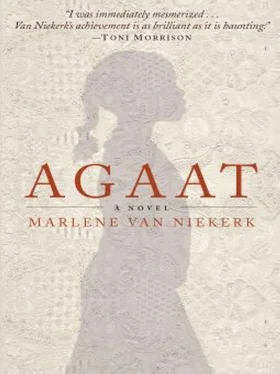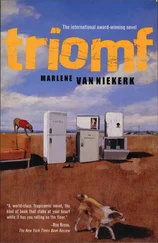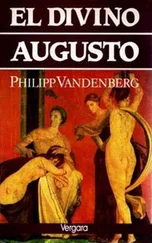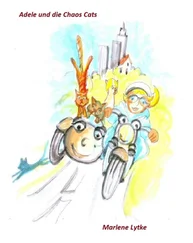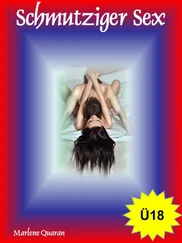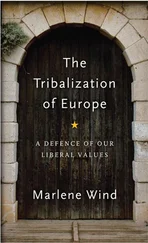She reads to me from the Bible every evening. Lamentations. How is the gold become dim! How is the most fine gold changed! The stones of the sanctuary are poured out in the top of every street. And then she prays. The Our Father . The safest prayer under the circumstances. Forgive us our trespasses.
Now it’s morning. The curtains are open. I’ve been washed, she’s dripped three drops of tea with a dropper at the back of my tongue, wiped out the inside of my mouth with a sponge, cursorily. The tea was cold. She’d forgotten to add sugar. The sponge was rough, bitterish. Aloe. Wormwood. The peppermint’s run out, and why buy a new tube at this stage?
Last night, was it last night? Or the night before last? The squabble about Jakkie? I could still blink with both eyes.
She spelt out everything I wanted to say. Not a word in reply. Stepped forward and back with the stick, kept on her glasses so that I couldn’t see her eyes. Looked at what I was blinking, tapped short and sharp with the duster handle, let me have my say as fast as she could, her voice neutral in repeating my questions for me, said nothing in reply. It was worse like that than when she imitates my intonation. That’s been her style the last few days. Cool and casual. But there’s a rumbling somewhere inside her.
I feel the tea trickle out of me. Would it be warmer now than when it went into me? Sweeter? Or salty? Or sad? I feel devastated by my outburst and spelt out like that I don’t even have the excuse that I lost my temper spontaneously, I wanted to get at her.
D·I·D Y·O·U R·E·A·L·L·Y H·A·V·E M·I·L·K W·H·E·N Y·O·U L·E·T J·A·K·K·I·E D·R·I·N·K F·R·O·M Y·O·U, question mark. W·H·Y D·I·D Y·O·U N·E·V·E·R T·E·L·L M·E T·H·A·T Y·O·U H·A·D S·E·E·N T. B·L·U·E E·M·P·E·R·O·R B·U·T·T·E·R·F·L·Y I·N T. F·O·R·E·S·T, question mark. I W·A·S T·H·E·R·E B·E·H·I·N·D T. R·O·C·K F·I·G I S·P·I·E·D O·N Y·O·U I S·A·W E·V·E·R·Y·T·H·I·N·G, exclamation mark. S·T·O·L·E H·I·M F·R·O·M M·E, exclamation mark. T·O·O·K H·I·M O·U·T O·F M·E F·U·L·L O·F B·L·O·O·D + S·L·I·M·E + W·R·A·P·P·E·D H·I·M + T·O·O·K H·I·M + N·E·V·E·R R·E·T·U·R·N·E·D H·I·M B·U·T Y·O·U S·A·W W·H·A·T C·A·M·E O·F I·T, colon. H·E W·H·O B·E·N·D·S T·O A H·I·M·S·E·L·F A J·O·Y D·O·T·H T·H·E W·I·N·G·E·D L·I·F·E full stop. D·E·S·T·R·O·Y, full stop. S·L·E·E·P·I·N·G P·I·L·L·S I·N H·I·S W·I·N·E Y·O·U C·O·U·L·D H·A·V·E K·I·L·L·E·D H·I·M T·H·A·T F·I·R·S·T L·E·T·T·E·R O·F H·I·S T·H·A·T S·U·P·P·O·S·E·D·L·Y A comma, A·R·R·I·V·E·D A M·O·N·T·H A·F·T·E·R H·E L·E·F·T, comma, S·L·A·N·T·E·D L·E·T·T·E·R·S F·O·R·W·A·R·D + B·A·C·K T·O question C·A·M·O·U·F·L·A·G·E Y·O·U·R H·A·N·D·W·R·I·T·I·N·G question mark. H·E K·N·E·W N·O·T·H·I·N·G O·F I·T H·E W·O·U·L·D N·O·T H·A·V·E U·S·E·D P·O·S·T O·F·F·I·C·E T·H·E·N + H·I·S C·O·N·C·E·R·N·E·D L·I·T·T·L·E C·A·L·L·S N·O·W·A·D·A·Y·S, question mark. D·O Y·O·U I·N·V·E·N·T·A·L·L T·H·A·T A·S W·E·L·L A·S Y·O·U A·L·W·A·Y·S D·I·D, question mark. I·T·S Y·O·U·R F·A·U·L·T T·H·A·T H·E L·E·F·T L·I·K·E T·H·A·T, exclamation mark. W·H·A·T A·L·L D·I·D Y·O·U T·E·L·L H·I·M I·N T·H·A·T P·L·A·N·E T·H·A·T N·I·G·H·T O·F H·I·S B·I·R·T·H·D·A·Y, ques tion mark. I·T·S Y·O·U·R F·A·U·L·T T·H·A·T J·A·K C·A·M·E T·O G·R·I·E·F N·O·T T·H·A·T I M·I·S·S H·I·M, accent mark, N·O·T I·N T. L·E·A·S·T, exclamation mark. B·U·T T·H·E·R·E = A·F·T·E·R A·L·L S·U·C·H A T·H·I·N·G A·S G·R·A·T·I·T·U·D·E, exclamation, D·I·S·G·R·A·C·E, exclamation. S·E·A·R·C·H·E·D W·H·O·L·E H·O·U·S·E C·R·O·S·S E·X·A·M·I·N·A·T·I·O·N·S + Y·O·U B·E·H·I·N·D T. K·I·T·C·H·E·N D·O·O·R L·I·S·T·E·N·I·N·G H·O·W Y·O·U·R P·L·O·T·S D·I·S·T·I·L, exclamation exclamation exclamation, M·Y O·N·L·Y C·H·I·L·D, exclamation D·O·E·S H·E K·N·O·W I A·M D·Y·I·N·G H·E·R·E, question mark. W·H·Y D·O Y·O·U K·E·E·P M·E I·N T·H·E D·A·R·K, swearword, A·B·O·U·T H·I·S P·L·A·N·S, exclamation question mark.
When I’d done, she came and stood by the foot of the bed, untied her apron, unbuttoned her dress in front, bared her small crooked shoulder in front of me and folded her hands in front of her. At first she talked, but the words had a cadence, a kind of songspeech it was, full of archaic expressions.
In the life of the sheep
weaning-time is the most critical time.
You who are the farmers of the future,
must make every effort to see
that the little lambs do not suffer over-much.
That their first growth is good is essential
because once marred in their development,
they never mend again.
I closed the eye that could close. I couldn’t look upon the crooked shoulder any longer, the expression on Agaat’s face, her mouth twisting as if she were weeping the words.
What did she want me to make of it?
Therefore, before you banish the ewes,
the lambs must walk for a while with their mothers
together in the best grazing
to acquaint them with their new place.
Although mourning can never be forestalled,
they will then have to suffer much less sorrow.
I could close one eye, that’s right, now I remember, that was the moment, that was when it happened for the first time, the other eye remained staring. And still I had to endure it, the incantation, on the pattern, so it sounded to me, of the aboriginal lamentations on Jakkie’s tape.
After separation the ewes must never
walk in the neighbouring camp,
but far enough on vlei and hill,
and best below the wind
for their bleating not to be heard by their lambs.
A child as is well-known,
can tell her mother’s voice from a thousand others,
and from as far away as four full miles.
And furthermore, as lambs are really stupid,
and huddle together against the fence,
and stampede themselves into a heap in one corner of the camp,
you must let a few old-ewes walk with them.
I tried to turn my eye up, downwards, sideways, but for the first time it was stuck, totally unyielding in its socket and I had to keep looking at her. I relaxed my focus, tried to haze out the image. But under the white cap the brown smudge of Agaat’s face kept looming, distorted, rippling, like an underwater statue singing.
The motherly full-mouthed sheep
will disinterestedly
calm the little weanlings,
and lure them to the grazing and to water
so that they do not lose condition.
Carefully to milk out the bereaved ewe,
is on the other hand your duty,
the more so if you have been blessed
with an abundant season.
When the song was done, she wrenched back her arm into its sleeve and went and sat in the Redman Chief, strapped herself in, clicked shut the buckle and started reading from a blue booklet. Only her lips moved. When she saw I was looking at her, she pressed the knob, grabbed the steering column and turned the chair, a soughing right-about turn. Only the high black back I could see, the chrome grips on either side, the deeply treaded black rubber of the back wheels. Only a whispering I heard from time to time from behind the backrest, moaning sounds, as if the chair had a life of its own.
Could I have dreamed it all? The snuffling, the forward and backward manoeuvring of the chair, the leisurely turnabouts, first this way round and the other way round? The fluttering of pages, the tearing sounds, the groaning, the sighing? The backward recline setting, the forward incline setting, the automatic rocking function, at a small angle, just lightly to and fro, to go to sleep? To relieve the bodily aches of the seated?
Читать дальше
